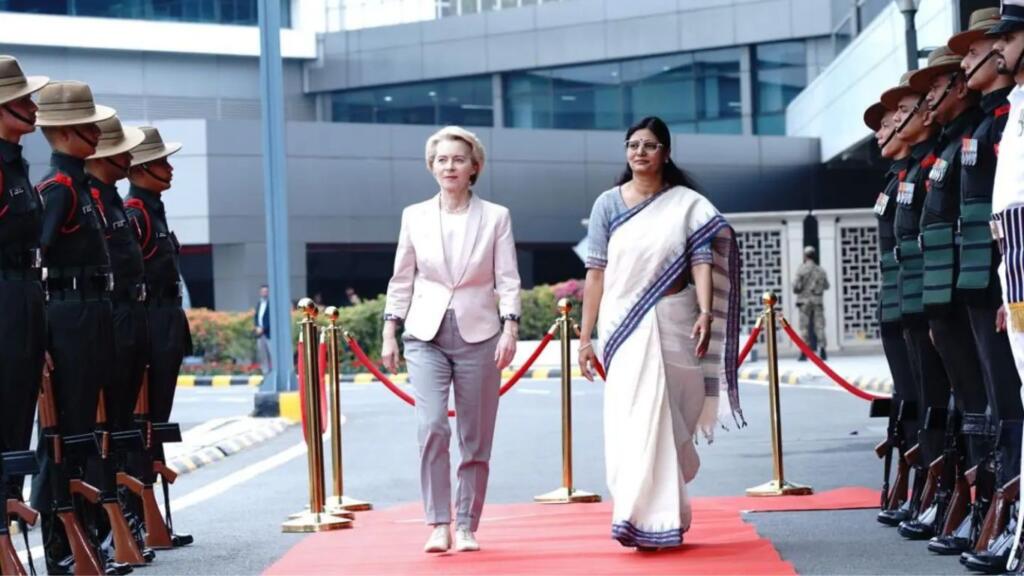European Commission President Ursula von der Leyen arrived in India on Thursday for a two-day official visit. The visit is aimed at strengthening diplomatic and commercial relations between the European Union (EU) and India. Accompanied by 22 of the 27 EU Commissioners, this marks the first-ever visit of the high-level College of Commissioners to India and their first collective overseas trip since assuming office in December 2024.
Union Minister of State for Health & Family Welfare Anupriya Patel welcomed von der Leyen at the Delhi airport. After arriving in Delhi, von der Leyen wrote on X, “Touchdown in Delhi with my team of Commissioners. In an era of conflicts and intense competition, you need trusted friends. For Europe, India is such a friend and a strategic ally. I’ll discuss with @narendramodi how to take our strategic partnership to the next level.”
📍Touchdown in Delhi with my team of Commissioners.
In an era of conflicts and intense competition, you need trusted friends.
For Europe, India is such a friend and a strategic ally.
I’ll discuss with @narendramodi how to take our strategic partnership to the next level. pic.twitter.com/I8ypHtwfy8
— Ursula von der Leyen (@vonderleyen) February 27, 2025
Strengthening Economic and Trade Relations
The visit of Ursula von der Leyen comes at a juncture as both India and the EU seek to sign the long-pending Free Trade Agreement (FTA). This visit is to smooth the negotiation process just before March. The focus will be on resolving differences regarding market access for European cars, wine and intellectual property rights.
The global context calls for us to conclude our free trade agreement.
Prime Minister @narendramodi and I have agreed to push to get it done during this year.
You can count on my full commitment. pic.twitter.com/ilRw8GGfHz
— Ursula von der Leyen (@vonderleyen) February 28, 2025
The EU, India’s largest trading partner in goods and, accounts for a good amount of India’s exports and foreign direct investment (FDI). In 2023-24, bilateral trade in goods surged to USD 135 billion, with Indian exports totalling USD 76 billion and imports from the EU amounting to USD 59 billion. Trade in services stood at USD 53 billion, while FDI inflows from the EU reached USD 117.4 billion from April 2000 to September 2024, representing 16.6% of India’s total FDI equity inflows.
Noting the importance of trade ties, an MEA official said, “European companies see immense opportunities in India. They have technology and competencies but lack scale. India, in turn, benefits by gaining access to their technology.”
Focus on Technology, Defence, and AI Cooperation
AI is likely to be on the table as collaboration on emerging technologies is important, especially in the current competitive sphere of AI. Prime Minister Narendra Modi participated in the Paris AI Action Summit, where he reaffirmed India’s commitment to AI advancements. The discussions will focus on cooperation in AI regulations and innovation. EU has initiated new legislation in AI to cope with new challenges, and India is all set to cooperate with the EU in order to leverage mutual strengths in the digital field.
In addition, defence and security cooperation, particularly in the Indo-Pacific region, is high on the agenda. Both India and the EU are looking to strengthen strategic ties in maritime security, defence technology, and regional stability.
Europe is ready to take greater responsibility for security and defense.
At the same time we want to strengthen security cooperation with trusted partners.
That’s why we’re exploring a future Security & Defence Partnership with India. pic.twitter.com/ax3WYHSAB6
— Ursula von der Leyen (@vonderleyen) February 28, 2025
Trade and Technology Council Ministerial Meeting
A key highlight of the visit is the second Ministerial Meeting of the Trade and Technology Council (TTC). Leaders from both sides is likely to discuss on digital and strategic technologies, resilient supply chains, clean and green technologies, and trade and investment strategies. The discussions aim to enhance cooperation in areas such as semiconductors, clean energy, green hydrogen, sustainable urbanization, and water management.
Dear @narendramodi, thank you so much for hosting us in New Delhi.
The @EU_Commission’s visit symbolises how much we value our partnership with India.
And how much I value our personal friendship. pic.twitter.com/9of8pPz126
— Ursula von der Leyen (@vonderleyen) February 28, 2025
With India and the EU aligning their strategic priorities, the visit is expected to accelerate negotiations on trade agreements and boost technological collaboration. After her meetings with Indian Foreign Minister Subrahmanyam Jaishankar and Prime Minister Narendra Modi, the outcomes will exhibit the hits and misses of the delegation’s visit. However, the visit is important in the sense that Europeans have understood the Indian capabilities and are actively engaging with India.
